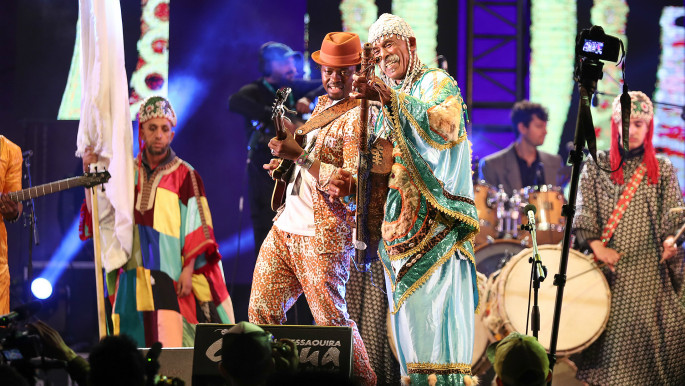Atlas Electronic Festival: Electronic music comes to Marrakech
Around seven miles away from the city of Marrakech, the 4th edition of Atlas Electronic Festival took place in an eco-lodge called Villa Janna.
Run by a collective of Dutch-Moroccans, the music policy was mostly slanted towards electronic music with a bit of traditional Gnaoua and desert blues thrown in as well.
The music was split between a main amphitheatre stage, tents and a dance floor situated by a swimming pool and bar.
And if it all got a bit too much, there were relaxation areas to wind down via gong meditations, films from visual artists and yoga sessions during the day.
 |
|
| Read also: Morocco's Gnaoua Festival: Fusing global sounds under one roof |
In terms of size and capacity, the site itself was a very intimate affair with no less than 1,500 people present at any given time, with it pushing towards 2,000 on Saturday night.
Though it wasn't heavy in number, it was packing in intensity and atmosphere.
One example of this was the all-female ensemble and Marrakech natives, Hourriyet, who garnered by far the biggest reception and crowd to the amphitheatre stage.
The only instruments the group plays are percussive instruments of various hand drums, where they sing traditional Moroccan chants. Usually, this sort of music is reserved for weddings and parties, but at a contemporary music festival made up of mostly Moroccans, this goes down a storm.
Although they only play around four songs, each one is about five or so minutes long and the individuals onstage are exhausted after about half an hour. Anyone following on from Hourriyet would prove to be a tough act to follow.
Immediately following them, were Maalem Moukhtar Guinia and UK dance producer James Holden. The son of the late Mahmoud Guinia, Moukhtar collaborated with Holden for an experimental project of traditional Gnaoua and ambient, electronic samples.
The result? Hit and miss, but not owing to the group's efforts, but rather the weather as very-seldom-seen-rain-in-August rain poured on the outdoor stage, meaning covers had to put on equipment and short intervals to try and find cover from the downpour. In truth, the music was better served without samples, as it sounded great as a stand-alone group.
Staying with Gnaoua, Maalem Hassan Guediri played an all-night set in one of the tents at Villa Janna. It went on from midnight until the early hours of the morning, in time to watch the sunrise.
Normally, Guediri plays at the Jemaa el Fnaa every night, but this evening he and his sons who are in his band performed in near-darkness whilst his band played on.
The crowd danced along with some noticeably getting into trances whilst frankincense was passed around, which is part of the tradition of a Gnaoua night.
UK singer-songwriter and producer Kamaal Williams played three different sets throughout Saturday nights back to back, for an hour each.
Each performance brought a different style, with them being jazz, electronica and house music. Each show had different band members and audiences as people tuned in and dropped out as and when they pleased, such was the benefit of being at a festival, with other things going on at the same time.
Yousif Nur is a freelance journalist, with a particular focus on music and culture in the Arab World. His journalism work has been featured in The Guardian, Telegraph, Dazed & Confused, Middle East Eye, Vice amongst many others.
Follow him on Twitter: @yousifnur







